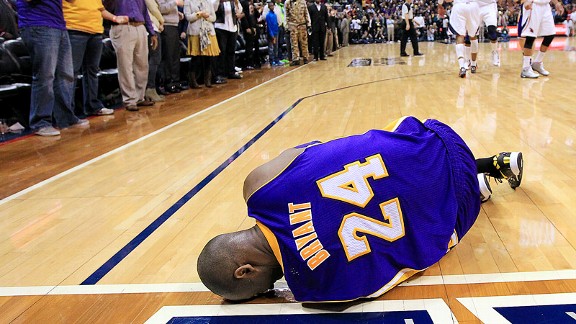The Western Conference playoff race continues to be a battle of which team can be the least worst, and the Utah Jazz are losing. Of the four teams fighting for the final three spots in the playoffs, only the Rockets played a quality game last night, blowing out the hapless Phoenix Suns. Second best game of the night belonged to the Warriors, who struggled to close out the Detroit Pistons. Not a good look, but certainly a better one than the Lakers’ loss to the Hawks, or the Jazz’ loss to the Thunder. Merely treading water is enough to secure the sixth seed at this point.

But that’s not entirely fair to the Western Conference, which is still head and shoulders above the Eastern Conference. So far this year in inter-conference matchups, the Western Conference is 225-162, a healthy 58% winning percentage. This leads to absurd situations where the Milwaukee Bucks, who have played the league’s third easiest schedule and will likely finish 41-41, are assured of making the playoffs and the Utah Jazz, who have played the league’s eighth toughest schedule and will likely finish 41-41, are in the playoff fight for their lives. Basketball Reference’s Simple Rating System calculates that both the Utah Jazz and Dallas Mavericks—both unlikely to make the playoffs—are better than the Bucks.
With 20% of the season left to play, the drama is all but over. The playoff teams in the East are all set, so all that is left is mild jockeying for position, unless you count tanking as a “race”. In the West there is aforementioned battle among four teams for three playoff spots, but that’s about it. On a related note, last night Carmelo Anthony, Tyson Chandler and Kobe Bryant all left their respective games with serious looking injuries, and the day before Kyrie Irving was shut down for the rest of the year.

The implication is clear: the season is too damn long. This is not a new observation. Last offseason David Stern said that NBA owners would consider a shorter schedule, while J.A. Adande, Sandy Weil and another have all offered up proposals for how to structure a shortened season. Today I submit my own.
In the current NBA schedule, each team plays opponents in the other conference twice (30 games), opponents in its own division four times (16 games), and opponents in the other two divisions in its conference either three or four times (36 games). This leads to some lopsided strength of schedules, because of the aforementioned difference in strength between conferences, and because of the difference in which out of division teams are played three or four times. Compacting this 82 game schedule in 6 months lead to “schedule losses”, where teams barely even have a chance before the game is played. The second game of back-to-backs in general, especially when there is long travel involved, are almost automatic losses. NBA players just can’t play as well in their second game in 24 hours with a three hour flight in-between, especially if they’re flying to high altitude destinations like Salt Lake City or Denver.
Therefore, there are two main considerations I’m following when creating a new schedule. It needs to be properly balanced, and it needs to be shorter. For inspiration, I turn to soccer.
In almost every soccer league in the world, they don’t have standings with divisions and conferences, but a single “table”. Every single team in the league (usually 20), plays every other team twice, for a 38 game season. At the end of the season the winner is the team with the most points. No playoffs, no nothing.
Don’t worry, I’m not getting rid of the playoffs, but I do think a soccer-style table should be introduced for the NBA. Every other team plays every other team twice, once at home and once away, for a total of a 58 game season. At the end of the season the top 16 teams make the playoffs, 1 vs. 16, 2 vs. 15 etc.
Now, a primary driver of the NBA schedule is the huge distances teams have to travel. Most every other country in the world is geographically smaller than the United States: the longest distance between two teams in the English Premier League is a bit under 300 miles, which is about half as far as the Portland Trail Blazers are to their NEAREST opponent. That’s why teams play more games against teams within their division and conference, which are usually much closer.
But already teams play every other team in the league twice, there’s just additional teams they play three and four times. My proposal gets rid of these extra games, giving players extra time off to rest their bodies. Every game would have heightened importance, healthier and better rested players, leading to a higher quality product. It also affords more scheduling flexibility, allowing schedule-makers insure that every night has a compelling match-up or two.
What would a single table look like if instituted today? I have to do a bit of fudging to make the numbers work, and of course every team hasn’t played every other team twice yet, but a single table would look something like this:
Rank, Team, Winning Percentage
1. Miami Heat 0.79
2. San Antonio Spurs 0.78
3. Oklahoma City Thunder 0.73
4. Memphis Grizzlies 0.72
5. Los Angeles Clippers 0.68
6. Denver Nuggets 0.64
7. Indiana Pacers 0.61
8. New York Knicks 0.6
9. Houston Rockets 0.59
10. Golden State Warriors 0.59
11. Atlanta Hawks 0.54
12. Boston Celtics 0.54
13. Brooklyn Nets 0.54
14. Los Angeles Lakers 0.54
15. Utah Jazz 0.52
16. Chicago Bulls 0.49
17. Dallas Mavericks 0.49
18. Milwaukee Bucks 0.49
19. Portland Trail Blazers 0.47
20. Sacramento Kings 0.39
21. Toronto Raptors 0.38
22. Philadelphia 76ers 0.38
23. Minnesota Timberwolves 0.37
24. New Orleans Hornets 0.35
25. Washington Wizards 0.35
26. Phoenix Suns 0.33
27. Cleveland Cavaliers 0.31
28. Orlando Magic 0.31
29. Detroit Pistons 0.29
30. Charlotte Bobcats 0.21
Leading to playoff matchups of:
Miami Heat vs. Chicago Bulls
San Antonio Spurs vs. Utah Jazz
Oklahoma City Thunder vs. Los Angeles Lakers
Memphis Grizzlies vs. Brooklyn Nets
Los Angeles Clippers vs. Boston Celtics
Denver Nuggets vs. Atlanta Hawks
Indiana Pacers vs. Golden State Warriors
New York Knicks vs. Houston Rockets
Isn’t that a much better system? A system where a team like the Rockets, who are having a very good season, don’t get screwed by being in the Western Conference and have to play the Thunder in the first round? A system where the Nets aren’t gifted home court advantage because they get to play the Raptors and 76ers four times a year? A system where Carmelo Anthony wouldn’t be playing back-to-back games, travelling from Oakland to Denver overnight, on a knee injury?
I’m sure there are plenty of negative financial repercussions of this shift, but that’s not really the point. Basketball can be better, and should be. This would make basketball better.


I’m not sure the Players’ Association would be in favor of cutting the schedule all the way to 58, let alone the NBA. “Too many jobs would be cut” in the league itself. Depth becomes a lot less important when the season is shorter. The best players would play more minutes, too. Those are arguments for a better on-court product, but that doesn’t mean it would work pragmatically for anyone voting on it.
“Too many jobs would be cut” in the league itself
its amazing people so dumb can vote.
having less games does NOT mean having rosters trimmed down.
that is a totally other negotiation.
will you need less 10th and 12th guys on the bench? yes. but lets face it, those guys dont play unless you are 30pts up or down.
having star players on the court 2-3mins more is not a problem if they play less often.
I cant think of many professional sports (ok baseball but I meant real sport, not bowling, golf, baseball) where you read about teams in April saying “We havent had a full practice since early February”.
58 games means 12 less home games, thats a quarter of their home revenue. that could be a hard selling point but if TV contracts become bigger and bigger, it wouldnt make a difference in the long run.
taking away 2-3 games per month would be a drastic change physically.
the pounding on the knees, back and ankles players take is simply too much with players bigger and faster than ever.
this isnt hockey which you can play with a broken foot.
but it wont happen because the league doesnt have to do it. why should they?
to protect their players? theyre a dime a dozen. there will always be a next jordan, kobe, durant, rose. to make the product better and not have team sleepwalk on their 3rd straight game while fans who pay a huge amount for tickets get treated to crappy basketball? cmon, if it makes you more money, then you will get interest but player health and a better product with less burned out teams playing? not a big seller.